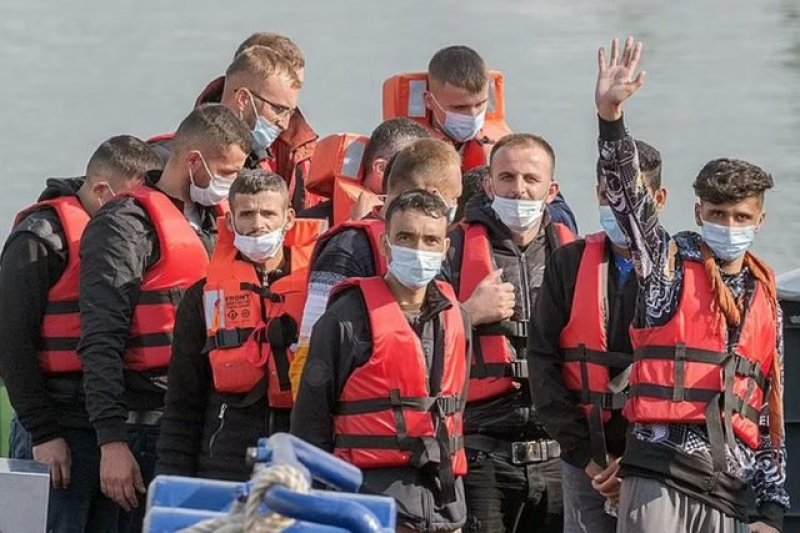Inside Albanian People Smuggling Network Driving Surge in Asylum Seekers
The surge in Albanian migration to the UK is being driven by a 'very successful' people smuggling network that sees migrants passed from 'middle men' in Albania to Kurdish gangs in France, an investigation has found.
Migrants who have flown to northern France from Albania book cheap B&Bs in Dunkirk while they wait for good conditions to make the crossing, it is claimed.
As they board rubber dinghies, gangsters take photos of them to ensure they pay the £4,300 fee, reported The Times.
The newspaper spoke to official sources and the migrants themselves in order to build a picture of how Albanians are reaching the UK.
More than 12,000 Albanians have arrived in the UK so far this year - around 10,000 of whom are understood to be young single men.
Their journey often begins in poorer areas like the city of Kukes in the north east of the country, where up to a third of people aged 16 to 29 are unemployed.
Smugglers advertise their services on social media, particularly TikTok, and once they have recruited someone they move them along the chain to a compatriot based in northern France.
At this point, they will be passed on to Kurdish gangsters who operate the crossings to the UK.
Albanians have enjoyed visa-free travel with the EU since 2010, allowing most migrants to reach northern France on flights via cities like Barcelona and Brussels.
Once they've arrived near the Channel coast, most book cheap B&Bs while the poorest join asylum seekers from other countries in camps outside Calais.
Here, their contact details are passed onto Kurdish gangs, who provide details of when and where to meet for their crossings via the encrypted WhatsApp or Telegram apps.
Migrants or their families either pay the people smuggler who originally recruited them from the off, or the middle man in northern France.
The middle men usually received a commission of between £1,000 to £2,000, some of which also goes to their accomplices in Albania.
To ensure any outstanding funds are paid, the Kurdish gangs take photos of each migrant and their passports. Migrants said anyone who crosses the people smugglers risks being hunted down and killed in the UK.
Another source in France said: “It’s a very successful model. We haven’t seen any fights, or murdering between Albanian and Kurds.”
Ministers have repeatedly vowed to crack down on young male migrants from Albania, with immigration minister Robert Jenrick vowing the Government would work on a ‘fast-track’ system to speed up the removal of migrants with no right to stay in Britain.
The plans also include reforms to the Modern Slavery Act. Mr Jenrick told the Telegraph that Albanians were ‘abusing’ the act and delaying deportation attempts.
Home Office figures show the number of Albanian migrants claiming to be victims of modern slavery is set to double this year to 5,000.
Other proposals could see Albanians deported before they can appeal against rejected asylum claims, put on immigration bail or tagged to prevent them absconding.
Mr Jenrick said many of those arriving from Albania as ‘young males who are fit, healthy, prosperous enough to pay the criminal gangs to get here’.
Fuelling the illegal trade is the perception of the UK as a 'soft target' compared to other wealthy European nations, officials say.
In France, most asylum claims from Albanians are rejected within days or weeks, while anyone appealing their case is sent back to Albania to await the outcome of their appeal there.
Didier Leschi, managing director of the French Office of Immigration and Integration, said France has put in place a fast-track procedure to deal with Albanian asylum claims in a matter of days or weeks.
The vast majority are rejected, and anyone who appeals has to await the outcome in Albania rather than staying in France.
Albania's prime minister has previously accused the government of 'discriminating' against his people and said it was ‘insane’ to blame his country for the UK’s immigration and crime woes.
Some 39,913 migrants have arrived in the UK after crossing the Channel this year, provisional figures show. The Ministry of Defence said 46 people arrived in one boat on Monday.
(Source: Mail Online)














